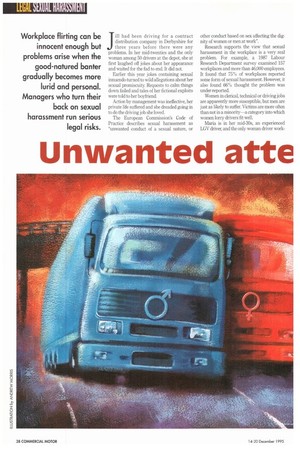Unwanted atte tion
Page 40

Page 41

If you've noticed an error in this article please click here to report it so we can fix it.
Workplace flirting can be innocent enough but problems arise when the good-natured banter gradually becomes more lurid and personal. Managers who turn their back on sexual harassment run serious legal risks.
Jill had been driving for a contract distribution company in Derbyshire for three years before there were any problems. In her mid-twenties and the only woman among 50 drivers at the depot, she at first laughed off jokes about her appearance and waited for the fad to end. It did not.
Earlier this year jokes containing sexual innuendo turned to wild allegations about her sexual promiscuity. Requests to calm things down failed and tales of her fictional exploits were told to her boyfriend.
Action by management was ineffective, her private life suffered and she dreaded going in to do the driving job she loved.
The European Commission's Code of Practice describes sexual harassment as "unwanted conduct of a sexual nature, or other conduct based on sex affecting the dignity of women or men at work".
Research supports the view that sexual harassment in the workplace is a very real problem. For example, a 1987 Labour Research Department survey examined 157 workplaces and more than 46,000 employees. It found that 75% of workplaces reported some form of sexual harassment. However, it also found 66% thought the problem was under-reported.
Women in clerical, technical or driving jobs are apparently more susceptible, but men are just as likely to suffer. Victims are more often than not in a minority—a category into which women lorry drivers fit well.
Maria is in her mid-30s, an experienced LGV driver, and the only woman driver work ing for an operator based in the West Midlands. She felt forced to resign when her predicament became intolerable.
"She was no shrinking violet and had been driving for a number of other companies before this one. The problems she had to face were awful it began with jokes but the behaviour became much worse. For example, drivers urinated or exposed themselves in front of her. At first she was loath to complain officially, but in the end she wanted it to stop," says the Transport & General Workers Union's Lindy Wiston who recently dealt with the case.
Married to a lorry driver, Wiston is also one of the T&GWU's specialist women's officers who operate in each of its eight regions. They offer guidance and counselling to members with such problems.
For non-members, making sure employers are aware of their liabilities should help if a problem emerges.
Talking to others with similar experiences can help too. Ilona Richards is president of the Lady Truckers Club which helps women with difficulties of all kinds. Richards recommends responding by being off-hand and flippant, but acknowledges things can get uncomfortable: "The serious type of harassment usually takes place in a quiet place, out of sight and earshot of onlookers because then there is no witness and it is harder to prove. Some men like to exert their masculine power over women, especially if they don't like them and want them out of the company."
Discrimination
Sexual harassment itself is not dealt with specifically by legislation under the Sex Discrimination Act of 1975. However, harassment is a form of discrimination and if somebody has suffered a "detriment" (a disadvantage) based on gender, it is covered under the act. A detriment will be obvious if such conduct causes resignation, or affects health. Consequently if you are an employer and it happens in your company, you could find yourself in trouble.
Under the SDA, employers are liable for any discriminatory acts caused by employees in the course of their work, whether they knew about it or not.
"It is important to emphasise that any employer which does not have a specific policy for dealing with sexual harassment and discrimination leaves itself open to litigation," says Wiston. "If we got to a tribunal with an employer, it could almost automatically be found guilty because there was no provision for dealing with it. In other words, it could be automatically unfair."
While industrial tribunals offer redress, the experience can be harrowing. And while compensation can be awarded there is no power of job reinstatement.
In Maria's case the company had no policy. Its solution was to move her to another depot, which she felt compounded the problem and suggested she was at fault. She had been employed for less than two years when she resigned, had no claim for constructive dismissal and a tribunal seemed the only route. However, having instigated proceedings (required within three months of the last incident) good sense prevailed before things reached the hearing stage.
Maria was reinstated and the company made it clear to the drivers that there would be serious consequences for perpetrators.
"The company took every measure to solve the problem and even implemented a procedure to deal with this and future problems," says Wiston.
Maria is still being sent to Coventry by some of the drivers, but she can handle that. It's preferable to the sexual harassment.
However, Wiston says there are cases which are more simply resolved because the men do not realise they are causing offence. Sometimes other drivers will stop it before things become strained.
Sarah Purchase, an WV driver for 17 years, agrees. She is currently driving for a Swindon-based family firm called Richman Transport, which is trouble-free. However, her work often involves nights out at trucks-tops and these can occasionally involve tricky moments: "If you have a drink at the bar, most will respect you once they discover you are a lady truck driver. If anyone does get funny, 99% of the time there is another driver who will step in and say something to ease the situation," she says.
A recent survey among women clerical workers carried out by psychologists at Lancaster University found that far from feeling upset by the sexual banter, many women actually accept it as office talk. While they said they did not like it, many agreed the men would often be unaware that their behaviour could be construed as sexual harassment.
Perpetrators
If, as Ilona Richards says, serious sexual harassment is about power, there is little doubt that the perpetrators appreciate what is goink on. For example Caroline Crolley, the Derbyshire T&GWTJ official who dealt with Jill's case, says: "The men couldn't claim that she wasn't up to the job, because she had been there for so long. It was a power thing. The men knew exactly what they were doing. They were deliberately making her feel uncomfortable."
Jill is still working for the same company. The problem has been solved and the drivers warned about potential repercussions if further incidents are reported.
As a national operator, the company realised that problems could develop at any of its other depots around the UK, and has drawn up a national policy.
ual harassment) is happening, and to be able to take the appropriate action to stop it early" by Steve McQueen












































































































